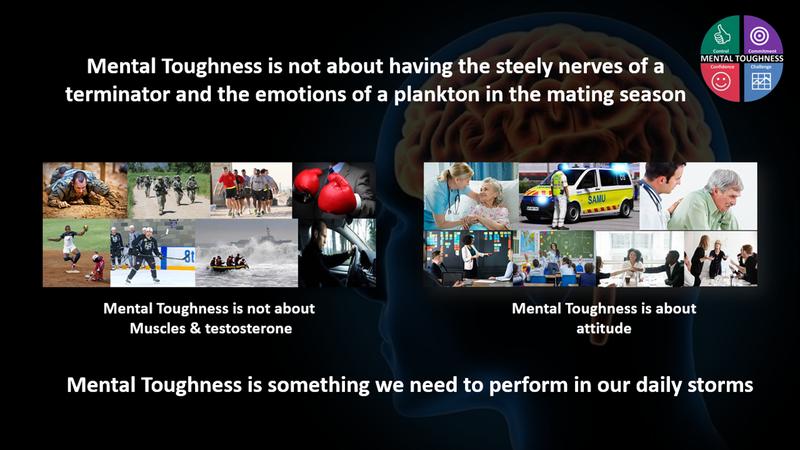Mental Toughness and emotions
Mental Toughness and emotions
Mental Toughness often seems to be portrayed as something very masculine and all about having steely nerves, cold blooded calm and the emotions of plankton during the mating season. In fact images associated with articles on Mental Toughness are invariably musclebound males from the world of sport (often rugby, boxing …) or from the military (Navy Seals, SAS...); unless of course the article is about emotions (and their negative impact) and then you start to see images of women.
In the 4C's model of Mental Toughness, one of the 4 C’s is Control with a sub-scale of “Emotional Control”, defined as “I can manage my emotions and the emotions of others”. Emotional Control conjures up images of someone with fists clenched & teeth gritted and denying anger, frustration, disappointment, etc.
When working on the emotional dimension of Mental Toughness, I tend to use the word “master” instead of “control”; maybe it’s because a lot of my work is in French and “control” has a somewhat negative connotation in French.
I try to help people move from simply being aware of their and others emotions to a mastery of not so much their own and others emotions, but more the way they express their emotions - their behavioural response to their emotional state
Victor Frankl said, “Everything can be taken from a man or a woman but one thing; the last of human freedoms — to choose one's attitude in any given set of circumstances, to choose one's own way."
Going back to my earlier comments on the Navy Seals, the SAS and other elite military units; I recently watched a documentary on French TV about the French GIGN (Groupe d’Intervention de la Gendarmerie Nationale) and, as one would expect, they are not “gung ho” terminators shooting at anything that moves. Yes they have (like all elite forces) high Mental Toughness but they are also humans with feelings and emotions; they have to make microsecond decisions (their freedom “to choose one's attitude in any given set of circumstances”) that will have an immediate impact on the lives of those they are trying to save, their colleagues and themselves.
Emotions happen to us, something happens in our external world and this creates emotions and feelings in our internal world; we do not "choose" to be happy, angry, frustrated, frightened, sad, etc.
Mental toughness is not about ignoring feelings or pretending they don’t exist; instead, it is the ability to perceive, use, understand, and manage them – what many people call today, “Emotional Intelligence”.
“Emotion, yet peace” - from the Jedi code
If you like this article, please leave a comment as it will help me in writing future articles.
Be the first to post a message!
